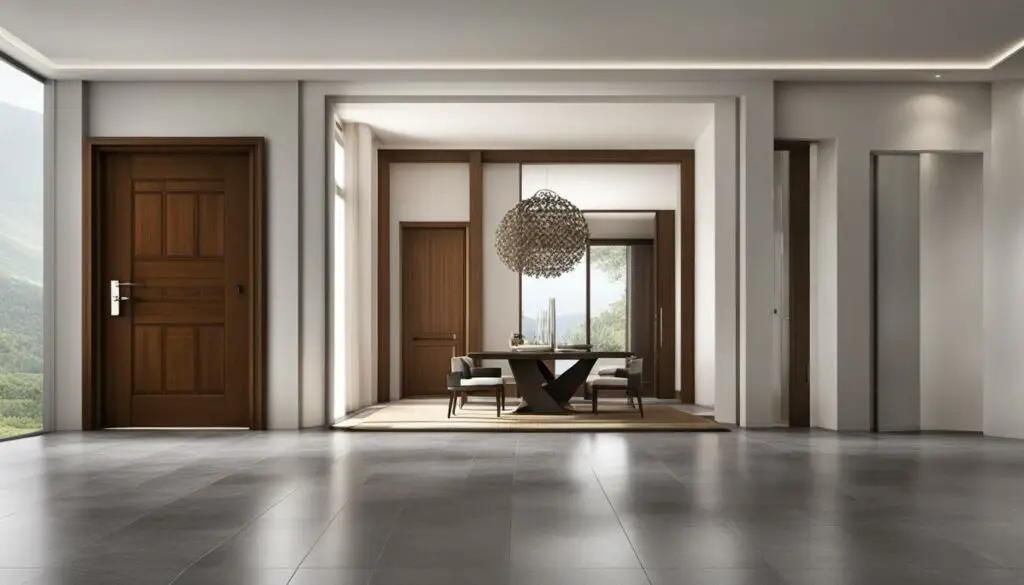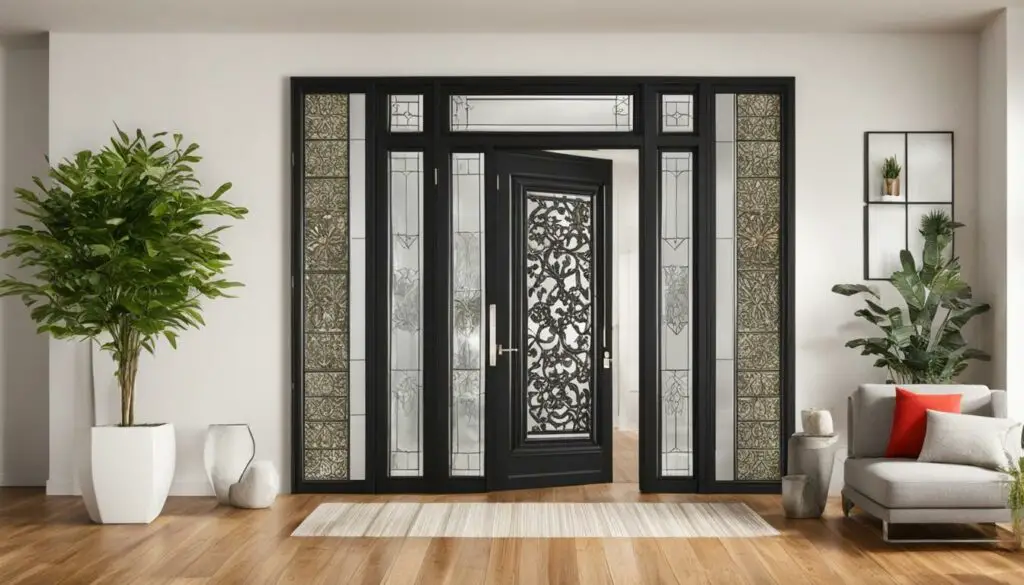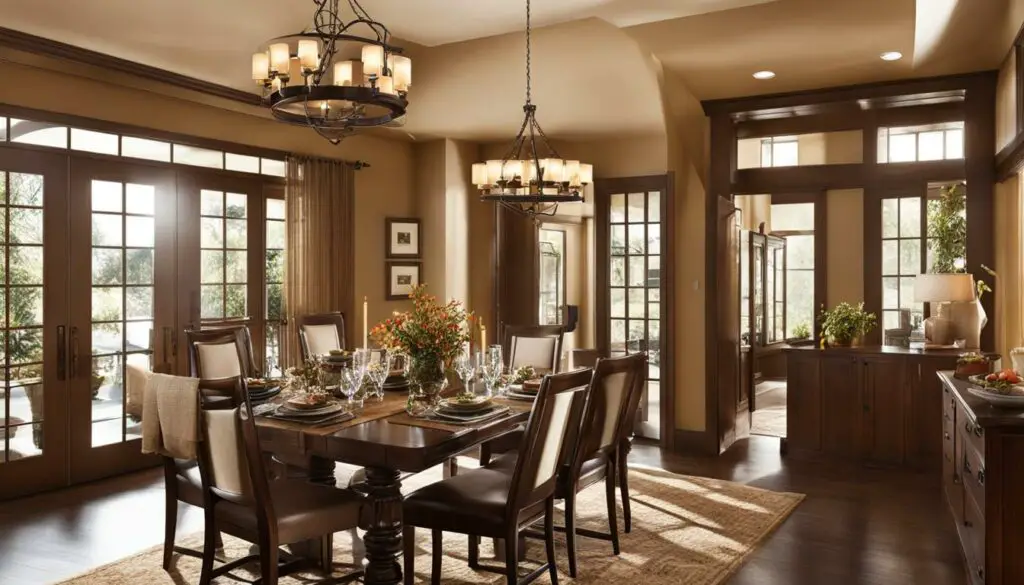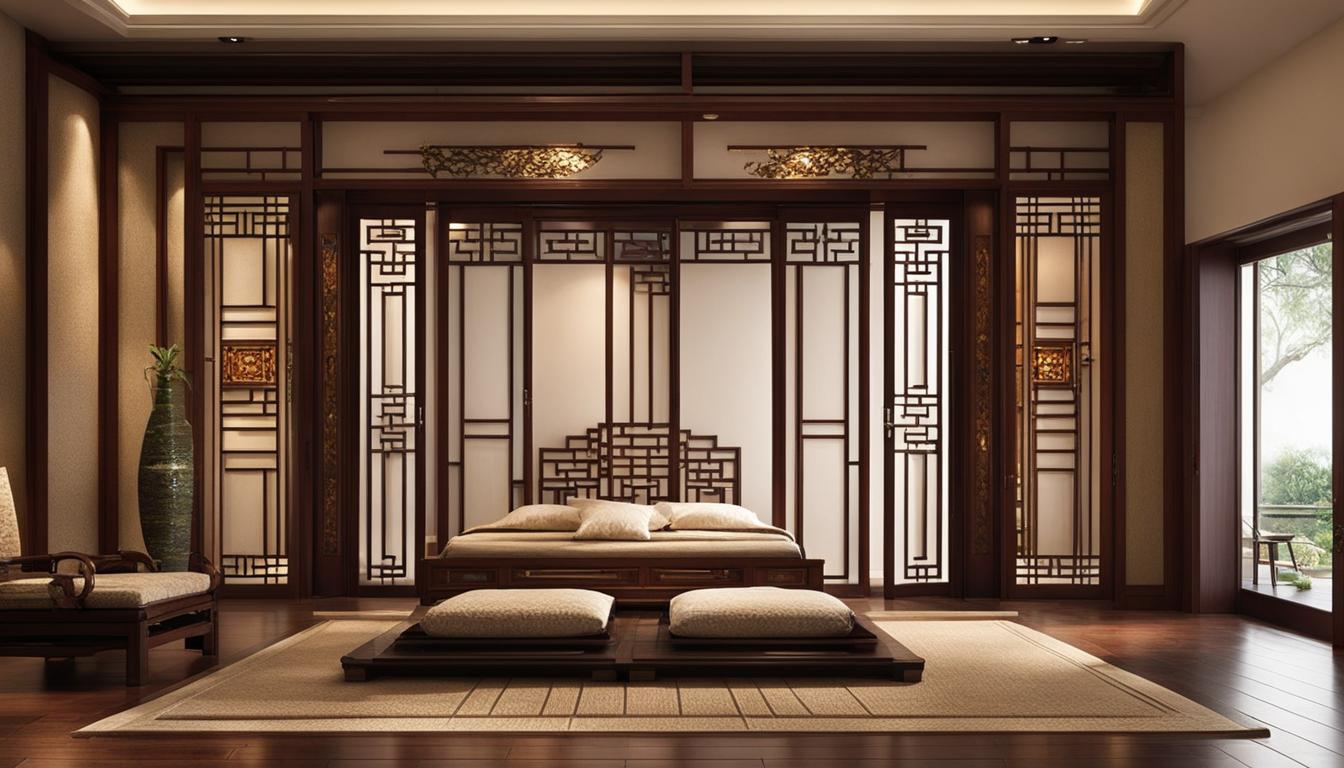Originally posted on January 9, 2024 @ 5:36 am
When it comes to creating a harmonious and balanced living space, feng shui principles are often taken into consideration. One aspect that is frequently discussed is door placement and its impact on energy flow. But what about having three doors in a room? Is it good feng shui or does it disrupt the harmony? Let’s explore this topic and find out!
Key Takeaways:
- Having three doors in a room can disrupt the flow of energy according to feng shui principles.
- Enfilade doors, or doors in a straight line, create a “hallway-like” effect that can disperse energy quickly.
- Adding hanging crystals or tall furniture can help remedy the energy dispersion caused by three doors.
- Proportion and balance play a crucial role in feng shui, including door size and its relationship to room dimensions.
- Choosing the right door size is essential for maintaining a harmonious energy flow in the space.
The Power of Proportions in Feng Shui

In the art of feng shui, proportion plays a vital role in creating a harmonious living environment. By ensuring that the dimensions of doors and rooms are balanced, you can enhance the positive energy and flow within the space. Proper door placement and size are essential aspects to consider when applying feng shui principles.
When it comes to door size and room size, it is important to establish proportional balance. The door should be in harmony with the overall dimensions of the room and its purpose. Following the 1/6th rule can provide guidance on determining the ideal door size for optimal energy flow and harmony in the space.
“Proportion is not just an aesthetic consideration; it has a direct impact on the energy flow and balance within a room.” – Feng Shui Master Li
Optimal energy flow can be achieved by choosing a door size that is proportionate to the room. If the door is too large, it can overpower the space and disrupt the flow of positive energy. Conversely, a door that is too small may restrict the energy flow, creating imbalances in the surrounding environment.
To illustrate this point, consider the following table that showcases the ideal door size based on room dimensions:
| Room Size | Ideal Door Size |
|---|---|
| Small Room (less than 100 sq ft) | 2.5 – 3 feet wide |
| Medium Room (100 – 200 sq ft) | 3 – 4 feet wide |
| Large Room (over 200 sq ft) | 4 – 5 feet wide |
By adhering to these proportionate guidelines, you can create a balanced environment that promotes positive energy flow and harmonious living.
Furthermore, don’t overlook the visual impact of proportion in feng shui. A door that is too small for a vast room can aesthetically appear out of place, while a large door in a small space can dominate the overall design. Achieving proportional balance not only enhances energy flow but also contributes to an aesthetically pleasing and cohesive atmosphere.
Proportions are at the heart of feng shui principles, contributing to the creation of a harmonious living space. By considering the size of doors in relation to room dimensions, you can optimize energy flow and promote a positive and balanced environment.
The Impact of Door Size on Energy Flow in Feng Shui

When it comes to feng shui, doors are more than just entrances and exits. They serve as gateways for energy flow within a space. The size of a door plays a crucial role in determining the balance and circulation of energy within a room. If a door is too small or too large for the room, it can disrupt the harmony and create imbalances in the energy flow.
In feng shui, balance is key. A well-proportioned door allows energy to move freely, facilitating a harmonious environment. Just like the flow of a river, energy needs to circulate smoothly to bring positive vibes and vitality to a space. When a door is properly sized, the energy moves effortlessly through it, nourishing the room and everyone in it.
On the other hand, a door that is too small restricts the energy flow, causing stagnation and blockages. This can lead to a decrease in positive energy and hinder the overall well-being of the occupants. Similarly, an oversized door can overpower the room, creating excessive energy and overwhelming the space.
To ensure a balanced energy flow in feng shui, it is important to consider the size of the door in relation to the room and other architectural elements. The door should be proportionate to the overall size of the space, creating a harmonious connection between the interior and exterior. This allows for a smooth circulation of energy, promoting a sense of balance and tranquility.
The Importance of Proportional Balance
Proportional balance is a fundamental principle in feng shui. It ensures that all elements in a space harmonize with each other, creating a visually pleasing and energetically balanced environment. When it comes to doors, maintaining proportional balance means selecting a door size that is in harmony with the room’s dimensions and purpose.
To achieve proportional balance in feng shui, you can follow guidelines such as the one-third rule. According to this rule, the size of the door should be approximately one-third of the width of the wall it is placed on. This guideline helps maintain a balanced visual proportion and supports the flow of energy throughout the space.
Remember, feng shui is about creating a holistic and harmonious living environment. By selecting the right door size and ensuring proportional balance, you can enhance the energy flow in your space and cultivate a sense of balance and well-being.
| Door Size | Impact on Energy Flow |
|---|---|
| Too Small | Restricts energy flow, causing stagnation and blockages. |
| Properly Proportioned | Allows for a smooth circulation of energy, promoting balance and harmony. |
| Too Large | Overpowers the space, creating excessive energy and overwhelming the room. |
Choosing the Right Door Size for Harmonious Feng Shui Arrangements

When it comes to creating a harmonious feng shui arrangement, one key factor to consider is choosing the right door size. The size of the door can greatly impact the flow of energy in a space and contribute to a balanced and harmonious environment. Here are some feng shui tips to help you select the appropriate door size for your home:
- Consider the size of the space: The dimensions of the room should be taken into account when determining the door size. A small room with a disproportionately large door can create an imbalance in energy flow, while a large room with a small door may restrict the circulation of positive energy.
- Think about the purpose of the room: The function of the room can also guide your decision in selecting the right door size. For example, a grand entrance with a wide door may be suitable for a welcoming foyer, while a smaller, more intimate door may be appropriate for a bedroom or a study.
- Embrace proportional balance: Maintaining proportional balance is essential in feng shui. Consider the overall aesthetics of the space and ensure that the door size complements the other architectural elements in the room. Aim for a visually appealing and balanced composition.
By taking these factors into consideration, you can ensure that the door size aligns with the principles of feng shui, contributing to a harmonious and balanced energy flow in your home.
“Choosing the right door size is crucial for creating a harmonious feng shui arrangement.”
Feng Shui Door Size Guidelines
| Door Size | Room Size | Ideal Proportions |
|---|---|---|
| Narrow Door | Small Room | Creates a sense of intimacy and privacy |
| Wide Door | Large Room | Elevates the sense of grandeur and openness |
| Standard-Sized Door | Medium-Sized Room | Provides a balanced and proportional appearance |
Remember, achieving a harmonious feng shui environment involves careful consideration of various elements, including door size. If you are uncertain about making the right choices, consulting a professional feng shui practitioner can provide tailored advice and expertise to help you create the desired balanced and harmonious living space.
The Significance of Door Size in Feng Shui

In feng shui, the size of doors holds great significance as they act as the entry points for energy to flow into a space. Choosing the right door size plays a crucial role in ensuring a balanced and harmonious energy flow throughout your home or office.
When it comes to feng shui, energy flow is key to creating a harmonious environment. Doors that are too small or too big can disrupt this flow and create imbalances in various aspects of life, including health, career, and relationships. By selecting properly proportionate door sizes, you can enhance positive energy and cultivate a balanced and inviting space.
Properly sized doors allow energy to move freely and circulate throughout the area. They create an optimal environment for the harmonious interaction of energies, resulting in a more balanced and tranquil atmosphere.
Remember, in feng shui, balance is everything!
To further illustrate the significance of door size in feng shui, let’s take a look at a table comparing the effects of different door sizes on energy flow:
| Door Size | Effect on Energy Flow |
|---|---|
| Too Small | Energy flow is restricted, leading to stagnation and blockages in different areas of life. |
| Properly Proportioned | Energy flows smoothly and harmoniously, promoting balance and positive vibes throughout the space. |
| Too Big | Energy disperses too quickly, resulting in a scattered and chaotic environment. |
As you can see, choosing the right door size is crucial for creating a harmonious and balanced energy flow in your living or working space. It’s essential to consider the overall dimensions of the area and ensure that the door size is proportionate to the surrounding elements.
By paying attention to door size and its impact on energy flow, you can create a more harmonious and inviting environment that supports your well-being and overall energetic balance.
Tips for Choosing the Right Door Size

When it comes to feng shui, selecting the right door size is essential for creating a harmonious environment with proportionate balance. Consider the following tips to ensure optimal energy flow and a balanced living space:
1. Measure and Evaluate
Start by measuring the dimensions of the room where the door will be installed. Take into account the overall size and purpose of the space. This will serve as a foundation for choosing an appropriately sized door that complements the room.
2. Proportional Balance
Apply the principle of proportionate balance by selecting a door size that harmonizes with the overall dimensions of the room. A door that is too large or too small can disrupt the flow of energy. Aim for a door size that complements the space without overpowering or diminishing its visual appeal.
3. The One-Third Rule
Consider following the one-third rule as a general guideline. This rule suggests that the size of the door should be approximately one-third of the overall width of the wall on which it is installed. This proportionate balance helps create a visually pleasing and harmonious environment.
4. Seek Professional Advice
If you are unsure about choosing the right door size, it’s always beneficial to consult a professional feng shui practitioner. They can provide expert guidance tailored to your specific needs and ensure that the door size aligns with the principles of feng shui.
Remember, selecting the right door size is crucial for maintaining the flow of positive energy and creating a harmonious environment. By considering the size of the space, applying proportional balance, and seeking expert advice if needed, you can ensure that your door enhances the overall feng shui of your home.
The Impact of Doorways in the Dining Room

In feng shui, the presence of doorways in the dining room plays an important role in the overall energy flow and balance of the space. The alignment of a doorway with where an individual sits can directly impact the qi, or life force energy, that enters from that particular door. To create a harmonious environment in your dining room, it’s essential to make specific feng shui adjustments to optimize the energy flow.
One effective adjustment you can make is hanging a crystal near the doorway. Crystals have the ability to disperse and enhance the flow of energy, creating a more balanced and vibrant atmosphere. By placing a crystal strategically near the doorway, you can help distribute the energy evenly throughout the dining room and promote a harmonious dining experience.
Furthermore, consider the placement of your dining table in relation to the doorways in the room. If possible, avoid positioning the table directly in line with a doorway, as this can disrupt the flow of energy and create an imbalance. Instead, try to position the dining table in a way that allows for a clear path of energy flow and a sense of stability in the room.
Example:
To better visualize these feng shui adjustments, consider the following example:
| Dining Room Layout | Feng Shui Adjustment |
|---|---|
| A dining table positioned directly in line with a doorway | Hanging a crystal near the doorway to disperse the energy and promote balance. |
| A dining table positioned at an angle to the doorways | Placing a tall plant or a decorative screen to create a visual barrier between the dining table and the doorway, allowing energy to flow smoothly. |
By making these feng shui adjustments, you can create a welcoming and harmonious environment in your dining room. This allows for a more enjoyable dining experience while also promoting positive energy flow and balance in the space. Remember, small tweaks can make a significant difference when it comes to creating optimal feng shui in your home.
Create Work-Home Separation for Feng Shui Harmony
When using a dining room as a home office space, it is important to create work-home separation for feng shui harmony. By implementing a few simple tips and tricks, you can transform your dining room into a harmonious environment that promotes balanced energy and productivity.
1. Use a separate desk: Set up a designated workspace within your dining room that is separate from the dining table. This creates a clear boundary between work and personal life and helps maintain focus.
2. Dedicating a specific area: Designate a specific area in your dining room as your work zone. This can be a corner of the room or a section of the dining table. By having a dedicated space for work, you signal to your mind that it is time for focused tasks.
“Creating a clear separation between work and personal life is essential for maintaining a harmonious feng shui environment.” – Feng Shui Expert Jane Powell
3. Draping a scarf: When you’re not working, drape a scarf or cloth over your workspace to visually separate it from the rest of the dining room. This simple act creates a physical barrier and helps maintain the separation between work and personal life.
4. Keep it clutter-free: Clutter can disrupt the flow of energy and create a sense of chaos in the workspace. Keep your work area organized and clutter-free to promote a peaceful and focused atmosphere.
Benefits of Work-Home Separation:
Creating work-home separation in your dining room can have several benefits:
- Promotes balance: Having a clear separation between work and personal life allows you to maintain a balance between your professional and personal responsibilities.
- Enhances focus: By dedicating a specific area for work, you create an environment that fosters concentration and productivity.
- Supports relaxation: When you’re not working, having a separate space to unwind and relax promotes a sense of calm and relaxation.
By implementing these feng shui tips for work-home separation, you can create a harmonious environment in your dining room that supports balanced energy and encourages a productive work-life balance.
Conclusion
Taking into account the impact of door size and placement in feng shui can greatly contribute to creating a harmonious environment and balanced energy flow. Proportional balance, proper door sizing, and the alignment of doorways with seating areas all play a significant role in fostering positive energy and a harmonious living space.
By following feng shui principles and making necessary adjustments, you can create an optimal living environment that promotes well-being and balance. Consider the dimensions of the room and select a door size that is proportionate to create a harmonious atmosphere. Ensure that doorways align with seating areas to enhance energy flow.
Whether you seek to promote tranquility in your home or create a balanced workplace, paying attention to door placement and energy flow is key. Implement these feng shui tips to generate a harmonious environment and maintain balanced energy throughout your space.
FAQ
Is having three doors in a straight line good feng shui?
According to feng shui principles, having three doors in a straight line can disrupt the flow of energy in a room. The passing of people through these doors can cause the energy to disperse quickly, creating a hallway-like effect instead of a harmonious living space. Hanging crystals or using tall furniture can help remedy this issue.
How does proportion play a role in feng shui?
Proportion is a key aspect of feng shui, as it helps create balance and positive energy in a room. When it comes to door size and room size, it is important to ensure that they are proportional to each other. The size of the door should be based on the dimensions of the room and its purpose. Following guidelines, such as the 1/6th rule, can help determine the ideal door size for optimal energy flow and harmony in the space.
How does door size affect energy flow in feng shui?
Doors play a significant role in energy flow in feng shui. The size of the door determines the amount of energy that can flow through it. A door that is too small or too large can disrupt the balance of energy in a room. It is important to have a door size that is proportionate to the room and other architectural elements, ensuring a smooth and balanced circulation of energy.
How do I choose the right door size for feng shui?
Selecting the appropriate door size is crucial for creating a harmonious feng shui arrangement. Doors that are too small or too big can disrupt the flow of energy and create imbalances in different areas of life. Consider the size of the space, the purpose of the room, and proportional balance when choosing the right door size. Hiring a professional feng shui practitioner can provide expert advice tailored to your specific needs.
Why is door size significant in feng shui?
In feng shui, doors are considered the entry points for energy to flow into a space. Choosing the right door size is essential for ensuring a balanced and harmonious energy flow. Doors that are too small or too big can disrupt the energy flow and create imbalances in different areas of life, such as health, career, and relationships. Properly proportionate door sizes can enhance positive energy and create a harmonious and inviting space.
What tips can you provide for choosing the right door size?
To choose the right door size for optimal feng shui, consider the size of the space and its purpose. Measure the dimensions of the room and select a door size that is proportionate to the overall size. Following a general guideline, like the 1/3rd rule, can help ensure proportional balance. If unsure, consulting a professional feng shui practitioner can provide expert guidance tailored to your specific needs.
How does the alignment of doorways in the dining room impact feng shui?
In feng shui, the presence of doorways in the dining room can affect the energy flow and balance in the space. The alignment of a doorway with where an individual sits can impact the qi coming from that door. Feng shui adjustments, such as hanging a crystal or moving the dining table, can help disperse the energy and create a harmonious environment for dining and work purposes.
How can I create work-home separation for feng shui harmony?
When using a dining room as a home office space, it is important to create work-home separation for feng shui harmony. Using a separate desk and dedicating a specific area for work can help maintain focus and allow for a healthy separation between work and personal life. Taking steps to create a clear boundary, such as draping a scarf over the workspace when not in use, can further support a harmonious environment.
